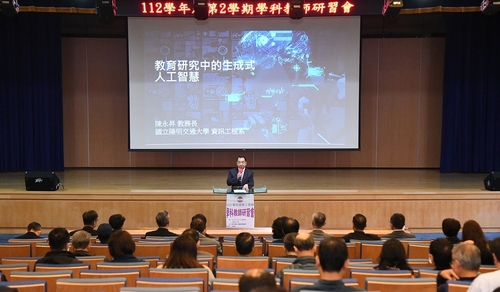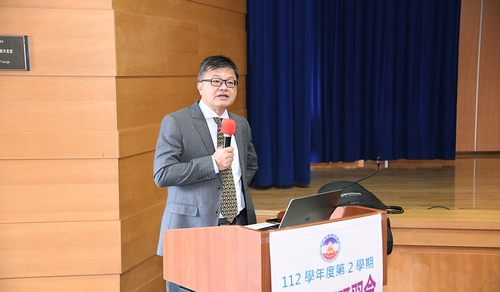Academic Ethics in the Age of AI—Seminar for Teachers at Central Police University


publish date :
2024-04-25
The seminar for teachers at Central Police University was held on February 23, 2024, at the International Conference Hall of the Science Building with a total of 127 teachers in attendance, including 98 full-time and 29 part-time teachers.
President Yang pointed out in his speech that with the rapid development of information technology, the liberalization and acceleration of information and capital flows have improved the convenience of modern life. However, at the same time, it has also given criminals opportunities to commit crimes. This has posted unprecedented challenges for us in maintaining public security.
In response to the rapid development of technology-related crimes, President Yang also mentioned that in 2023, CPU proposed the "Enhancing Teaching Capacity to Address New Forms of Crime" project, which was approved by the government with a budget allocation of NT$260 million dollars. This project aimed to establish advanced technological investigation systems, such as big data analysis, deep-fake video analysis, and technological investigation behavior analysis. In addition, it also sought to expand teaching capacity and professional classrooms to enhance training capacity in technological investigation. To bridge the teaching and practice of smart policing and technological investigation, the university established the "Smart Policing and Technological Investigation Team" last year. Led by President Yang, the group visited practical agencies to observe their operations. Additionally, workshops on "Technological Investigation Teaching" and "Smart Policing Studies" were held. Experts from practical units and faculty members were invited to share their experience with teachers on campus. Through these visits, teachers gained insights into the current practices of frontline law enforcement personnel. By integrating theory with practice, the aim is to enhance the curriculum to ensure that students could seamlessly transition into practical applications upon graduation, making valuable contributions to the nation.
In response to the rapid development of artificial intelligence technology, this seminar specifically invited Professor Yong-Sheng Chen, to give a keynote speech titled "Generative Artificial Intelligence in Educational Research". Professor Chen began by defining generative AI and explained how it utilizes deep learning techniques to generate and apply text, images, music, and more. He also highlighted that although ChatGPT has advantages such as automatic answer generation and code writing, ethical considerations must be taken into account. Professor Chen encouraged teachers to be familiar with both the applications and limitations of ChatGPT in teaching. In addition to assist teaching, teachers must first evaluate their acceptability of human-machine collaboration, and then instruct students on how to use ChatGPT responsibly, guiding them to understand its usage and limitations. Students, on the other hand, should enhance their knowledge in their respective fields, media literacy, and information literacy, and utilize human-machine collaboration methods appropriately for self-learning. Despite the controversies surrounding generative AI, Professor Chen encouraged teachers and students to use it while considering academic ethics and assessment fairness, leveraging its convenience to enhance teaching and learning effectiveness.
President Yang pointed out in his speech that with the rapid development of information technology, the liberalization and acceleration of information and capital flows have improved the convenience of modern life. However, at the same time, it has also given criminals opportunities to commit crimes. This has posted unprecedented challenges for us in maintaining public security.
In response to the rapid development of technology-related crimes, President Yang also mentioned that in 2023, CPU proposed the "Enhancing Teaching Capacity to Address New Forms of Crime" project, which was approved by the government with a budget allocation of NT$260 million dollars. This project aimed to establish advanced technological investigation systems, such as big data analysis, deep-fake video analysis, and technological investigation behavior analysis. In addition, it also sought to expand teaching capacity and professional classrooms to enhance training capacity in technological investigation. To bridge the teaching and practice of smart policing and technological investigation, the university established the "Smart Policing and Technological Investigation Team" last year. Led by President Yang, the group visited practical agencies to observe their operations. Additionally, workshops on "Technological Investigation Teaching" and "Smart Policing Studies" were held. Experts from practical units and faculty members were invited to share their experience with teachers on campus. Through these visits, teachers gained insights into the current practices of frontline law enforcement personnel. By integrating theory with practice, the aim is to enhance the curriculum to ensure that students could seamlessly transition into practical applications upon graduation, making valuable contributions to the nation.
In response to the rapid development of artificial intelligence technology, this seminar specifically invited Professor Yong-Sheng Chen, to give a keynote speech titled "Generative Artificial Intelligence in Educational Research". Professor Chen began by defining generative AI and explained how it utilizes deep learning techniques to generate and apply text, images, music, and more. He also highlighted that although ChatGPT has advantages such as automatic answer generation and code writing, ethical considerations must be taken into account. Professor Chen encouraged teachers to be familiar with both the applications and limitations of ChatGPT in teaching. In addition to assist teaching, teachers must first evaluate their acceptability of human-machine collaboration, and then instruct students on how to use ChatGPT responsibly, guiding them to understand its usage and limitations. Students, on the other hand, should enhance their knowledge in their respective fields, media literacy, and information literacy, and utilize human-machine collaboration methods appropriately for self-learning. Despite the controversies surrounding generative AI, Professor Chen encouraged teachers and students to use it while considering academic ethics and assessment fairness, leveraging its convenience to enhance teaching and learning effectiveness.